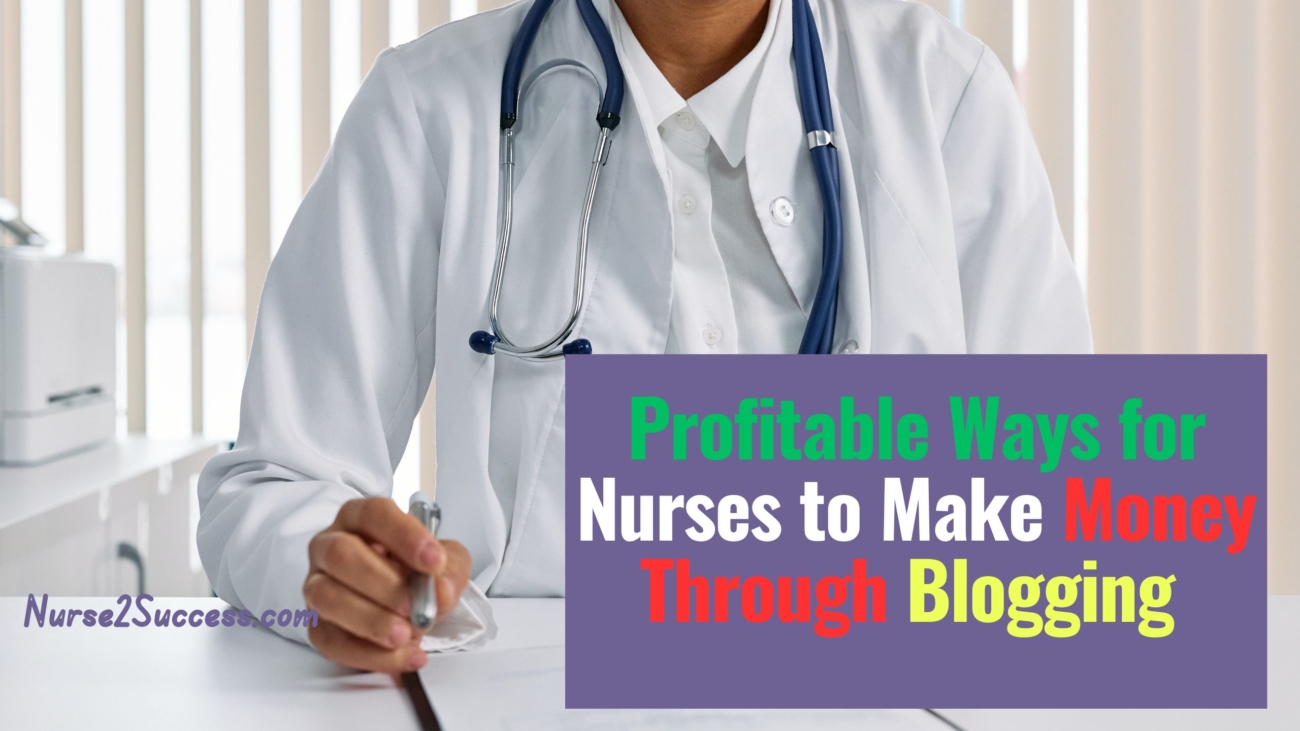Blogging is growing as a strong forum for nurses to not only share their experiences but also to access a world of income-generating options. In this thorough article, we’ll look at 10 tried-and-true strategies for nurses to monetise their blogs while also giving relevant material to other healthcare professionals. Whether you’re a seasoned blogger or just getting started, these tips can help you earn money while actively helping the nursing community. Learn how to use your nursing skills and online presence to develop a long-term and fulfilling blogging career.
Let’s take a closer look at each of these strategies:
Strategies For Nurses to Make Money Online
1.) Online Workshops and Courses
a.) Developing In-Depth instructional content for Nurses: This entails creating in-depth instructional content, which might take the form of online courses or workshops. To provide meaningful knowledge to your nursing audience, you must successfully design and structure your material.
b.) Course advertising: After developing your courses or workshops, effective advertising is essential. Use your blog, social media, and email marketing to reach out to future nursing students. Discounts, limited-time specials, and collaboration with nursing influencers are all examples of marketing methods.
Example: Creating a Nursing Skills Workshop: You may, for example, design an online session that focuses on improving certain nursing skills such as wound care, drug administration, or patient evaluation. You would plan the workshop.
2.) Promotion
a.) Monetizing with Display Ads: Display ads are adverts that are placed on your blog. You get money from user engagements like clicks and impressions. Google AdSense is a popular starting point for bloggers.
b.) Participating in Ad Networks: You can participate in ad networks that offer relevant adverts to your target audience. These networks assist in the management and optimisation of advertisements, making it easier to generate money from your site.
Example: Google AdSense on Your Nursing Blog: Google AdSense can display healthcare-related advertisements to your viewers, and when they click on these advertisements, you receive a percentage of the advertising money.
3.) Coaching/consulting
a.) Providing Nursing Career Guidance: Share your knowledge and ideas with other nurses who are searching for career advice. You can provide one-on-one or group counselling sessions to assist them in navigating their nursing careers, making educated decisions, and setting attainable objectives.
b.) Establishing Consulting prices: Base your consulting or coaching prices on your expertise, qualifications, and the value you deliver. Consider providing free initial consultations to demonstrate your skills and attract new clients.
For example, you may provide resume-building services, assisting nurses in creating beautiful resumes that stand out to potential employers. Share ideas for successfully promoting talents, experiences, and certifications.
4) Affiliate Promotion
a.) How Affiliate Marketing Works: Affiliate marketing entails collaborating with firms or items that are related to nursing. You advertise their products or services on your blog using unique affiliate links, and you receive a commission for each sale or action produced by those links.
b.) Finding Nursing Product and Service Partners: Look for nursing-related products or services that complement the content of your blog. Medical equipment, online courses, or healthcare technologies might all fall under this category.
Example: Promoting Medical Equipment on Your Blog: If you have expertise with specialised medical equipment, such as stethoscopes or blood pressure monitors, you may write reviews and instructions about it, including affiliate links to where you can buy it.
5.) Books and electronic books
a.) Writing Nursing-Related Books: This entails creating thorough books or ebooks on nursing-related themes. Authors can choose between traditional publication and self-publishing, with the latter growing more popular due to its ease of use and increased profits potential.
b-) Traditional publishing requires you to acquire a literary agency and a publisher, but self-publishing allows you to publish your work independently using platforms such as Amazon Kindle Direct Publishing (KDP).
As an example, consider “The Nurse’s Guide to Patient Care”: Consider authoring a book that covers critical areas of patient care, addresses frequent nursing issues, and offers practical answers.
6.) Donations and crowdfunding
a.) Creating contribution Platforms: Platforms such as Patreon or Ko-fi allow you to create contribution sites where your loyal followers may financially support your blog. To incentivize donations, provide rewards such as unique material, early access, or personalised shout-outs.
b.) connecting with Supporters: Express your gratitude to your supporters by directly connecting with them. Respond to donor comments, emails, or texts to promote a feeling of community and thanks.
Example: Patreon for Exclusive Nursing Content: Create a Patreon page where supporters may have access to premium nursing information, engage in Q&A sessions, or join a monthly nursing discussion group. This not only creates revenue but also develops your relationship with your target audience.
7.) Advertised Content
a.) Partnerships with Healthcare Brands: Collaborate with healthcare businesses that are related to your blog’s expertise. Create sponsored content that is relevant to the interests and requirements of your target audience. Make sure that sponsored posts are properly labelled.
b.) Maintaining Authenticity: Maintain the authenticity and trust you’ve earned with your audience while working with advertisers. Choose sponsorships that are truly in line with the goal and values of your site.
Example: Writing Sponsored Medical Device Reviews: You may work with medical device makers to produce honest and helpful product reviews. Share your thoughts and experiences regarding how these gadgets can help healthcare workers.
8) Speaking Engagements
a.) Sharing experience via Public Speaking: As a nurse, you may use your experience by speaking at nursing conferences, webinars, or seminars. Engage your audience by sharing your knowledge on relevant nursing subjects.
b.) Networking for Speaking Engagements: Networking within the nursing community might assist you in obtaining speaking engagements. Contact event organisers and submit ideas to speak on themes that interest you.
For example, imagine giving a session on “Effective Communication in Nursing” at a national nursing conference, where you share your ideas and experiences with other nurses.
9.) Membership Sites
a.) Establishing a Paid Community: Create a premium membership site where nurses may have access to special information, forums, or tools. Charge a monthly or yearly charge for admission to this valued community, providing your loyal readers with a one-of-a-kind experience.
b.) Providing Exclusive material: Provide premium material in addition to what is offered on your normal blog. This might offer comprehensive training, webinar access, or a private online community where nurses can connect and learn from one another.
Example: Premium Nursing Forum: Consider developing a paid forum where nurses may ask questions, exchange experiences, and seek advice from their colleagues. This results in a supportive and useful community for which members are prepared to pay.
10.) Offer Freelance Services
a.) Freelance Nursing-Related Services: Use your blog to promote your knowledge if you have specialised abilities in areas such as medical writing, chart auditing, or healthcare consulting. Offer your knowledge to healthcare organisations, healthcare entrepreneurs, or fellow bloggers in need.
b.) illustrate Your knowledge: Use your blog to illustrate your knowledge by providing instructive articles, case studies, or success stories about your freelancing services. Use social media and professional networks to connect with new clients.
Example: Freelance Medical Writing: Assume you are an expert in medical writing. In such scenario, you might offer clients in the healthcare field your services to create research papers, medical content for websites, or useful healthcare blog articles.
Conclusion
Blogging as a nurse is about more than simply sharing experiences; it’s about developing a successful online presence while making a significant contribution to the nursing sector. Implementing these 10 tried-and-true tactics will not only provide you with a continuous source of money, but will also brighten the lives of other nurses and healthcare aficionados. You have the opportunity to transform your passion for nursing into a satisfying and successful endeavour whether you want to educate through online courses, write educational ebooks, or engage in affiliate marketing. Accept these chances, tailor them to your own voice, and watch your nursing blog thrive financially and politically. As you continue on your path, keep in mind that your blog is more than simply a platform—it’s a source of education, support, and inspiration.



